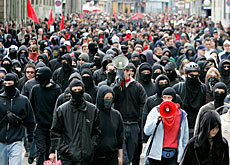
Protestors are “normal youngsters”

Today's youth has not become more violent according to Swiss sociologist Kurt Imhof. He says rioting, as seen recently in the capital Bern, is not a major problem.
Last weekend’s violence was triggered by a planned rightwing march through the city. But Imhof tells swissinfo that the members of the Black Block group that caused so much trouble aren’t really motivated by ideology.
The events left 21 people injured and caused more than SFr100,000 ($85,000) damage after protestors tried prevented a rightwing Swiss People’s Party march from reaching the parliament building.
The Black Block is a loose grouping of anarchists and extreme leftwing activists.
swissinfo: Do these violent demonstrators have an ideology?
Kurt Imhof: The ideological basis is very thin. It is built upon a specific understanding of a social criticism that has its roots in Marxism. This helps create a set of values for these youngsters. Rioting is for them a concrete application of their radical-Marxist convictions. They get the feeling they are doing something that makes sense. Young adults between the ages of 17 and 25 are particularly receptive to religious or political values – a phenomenon that is not new.
swissinfo: Who are these youngsters?
K.I.: They are a mixed bunch – apprentices, high school and university students, second-generation foreigners who grew up here. They are perfectly normal – young men who give their mothers flowers. They have a double life, just like most youngsters their age.
swissinfo: Shouldn’t students have a better understanding of politics?
K.I.: Comprehension of politics is generally not good, even among the younger generation. This has a lot to do with the quality of social studies and history classes deteriorating in the 1990s.
Since the middle of the last decade, youngsters have shown little political awareness. They are only interested in radically polarised politics – especially if you can add a dollop of adventure, such as rioting.
swissinfo: What influence has the rightwing Swiss People’s Party, which has polarised politics in the country, had on these youngsters?
K.I.: The polarisation of politics and the People’s Party decision to focus its election campaign on foreigners fits in with these youngsters’ worldview. This narrow view tells them that the games politicians are playing at the moment prove that Switzerland is becoming an oppressive country where foreigners are unwelcome. It also confirms their image of Switzerland as a financial centre that takes in dirty money, but turns back refugees.
swissinfo: So the People’s Party is reaping what it sowed?
K.I.: Yes, but not in a negative way. This is what the party was looking for. The youngsters’ behaviour in Bern helped the People’s Party score political points. Because these young adults are predictable, you can use them politically. It worked wonderfully in Bern. Everybody is defending the People’s Party’s right to express itself, and the party has once again taken centre stage.
swissinfo: Was the rioting in Bern also a sign of frustration that the other parties have failed to react to the People’s Party campaign?
K.I.: It is clear that these youngsters don’t think much of the other parties… They only focus on the People’s Party and far-right movements. They consider the People’s Party to be ideologically close to neo-Nazi groups and members of these groups did join last weekend’s rally.
swissinfo: We keep on hearing how much more violent youngsters are nowadays. How true is that?
K.I.: It’s all an exaggeration. But it is understandable, especially when the police come under attack. What we have today is a ritualised violence carried out by radical right and leftwing youngsters. But if you look at it from a historical perspective, there is no increase in violence. In the 1930s, in 1968 and in the 1980s, there were youth movements that were not especially circumspect about their actions.
swissinfo-interview: Corinne Buchser
The Black Block is the name of an underground grouping of mostly extreme left-wing militants that keeps a low profile when not involved in violent demonstrations.
There are other Black Blocks around the world, including in North America, and they have been involved in rioting at G8 summits.
The Swiss Black Block’s members have taken part in three violent incidents over the past three months, in Geneva, Lausanne and most recently Bern. They are also a regular “highlight” on May 1 in Zurich.
Some reports say the leadership are veteran activists based in Zurich aged over 50. An estimated 2,000 people are associated with the Swiss Black Block movement.
Kurt Imhof has been a professor of sociology at Zurich University since 2000.
He specialises in communication and media sociology, sociology of social change, communication theory and history, as well as sociology of minorities.

In compliance with the JTI standards
More: SWI swissinfo.ch certified by the Journalism Trust Initiative




























You can find an overview of ongoing debates with our journalists here . Please join us!
If you want to start a conversation about a topic raised in this article or want to report factual errors, email us at english@swissinfo.ch.